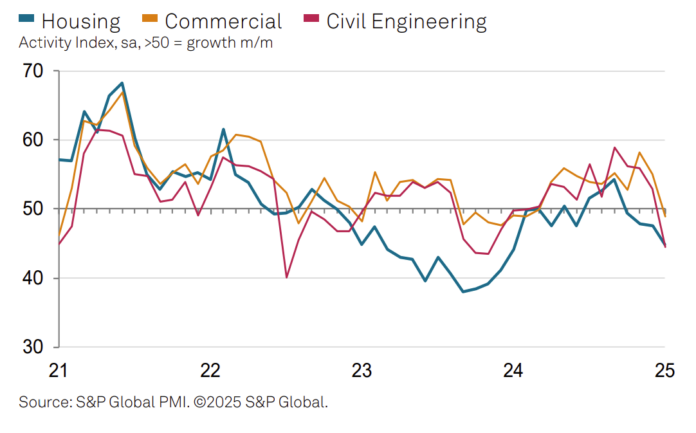A modest fall in total industry output was recorded at the start of the year, thereby ending a 10-month period of sustained expansion.
At 48.1 in January 2025, down sharply from 53.3 in December 2024, the S&P Global’s UK Construction Purchasing Managers’ Index (PMI) below the 50.0 no-change threshold for the first time since February 2024.
Furthermore, the report attributed shrinking order books and rising cost pressures as the contributing factors to the weakest business activity expectations since October 2023.
Index breakdown
Construction companies cited delayed decision-making by clients on major projects and general economic uncertainty had weighed on business activity at the start of 2025. A number of firms also commented on the impact of subdued market conditions in the residential building sector. Latest data showed that house building (index at 44.9) decreased for the fourth successive month and at the fastest pace since January 2024.
Civil engineering activity (44.6) declined at a relatively sharp rate, although this partly reflected disruptions from unusually wet weather at the start of the year. Meanwhile, output in the commercial construction category also returned to contraction in January (48.9). This was linked to a lack of tender opportunities and a reluctance among clients to commit to new projects.
New work and activity
January data also pointed to a decline in incoming new work for the first time in 12 months. Although only modest, the rate of contraction was the steepest since November 2023. Anecdotal evidence suggested that a lack of confidence among clients and worries about the UK economic outlook had contributed to fewer sales enquires.
Purchasing activity decreased for the second month in a row, reflecting weak order books and a lack of new work to replace completed projects. Despite softer demand for construction products and materials, the latest survey indicated the steepest rise in input costs since April 2023. Construction companies noted that suppliers had sought to pass on rising energy, transportation and staff costs. Moreover, vendor performance deteriorated to the greatest extent for two years, which was partly linked to shipping delays.
Sub-contractors
Sub-contractor charges increased at an accelerated pace in January, with the rate of inflation hitting a 21-month high. This was despite a reduction in sub-contractor usage for the fifth time in the past six months. Construction firms meanwhile signalled renewed cutbacks to their staffing levels. Employment decreased for the first time since August 2024, but the rate of decline was only marginal.
Finally, around 38% of the survey panel predict a rise in business activity over the year ahead, while only 17% forecast a reduction. However, this pointed to the lowest degree of business optimism since October 2023. Survey respondents cited a post-Budget dip in confidence among clients, alongside weakening sales pipelines and the impact of lacklustre domestic economic conditions.




